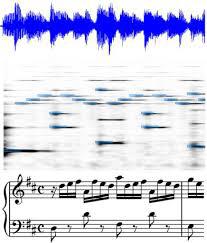Music Transcription
36 papers with code • 2 benchmarks • 9 datasets
Music transcription is the task of converting an acoustic musical signal into some form of music notation.
( Image credit: ISMIR 2015 Tutorial - Automatic Music Transcription )
Libraries
Use these libraries to find Music Transcription models and implementationsDatasets
Most implemented papers
Deep Complex Networks
Despite their attractive properties and potential for opening up entirely new neural architectures, complex-valued deep neural networks have been marginalized due to the absence of the building blocks required to design such models.
Enabling Factorized Piano Music Modeling and Generation with the MAESTRO Dataset
Generating musical audio directly with neural networks is notoriously difficult because it requires coherently modeling structure at many different timescales.
Music transcription modelling and composition using deep learning
We apply deep learning methods, specifically long short-term memory (LSTM) networks, to music transcription modelling and composition.
Learning Features of Music from Scratch
This paper introduces a new large-scale music dataset, MusicNet, to serve as a source of supervision and evaluation of machine learning methods for music research.
Residual Shuffle-Exchange Networks for Fast Processing of Long Sequences
Attention is a commonly used mechanism in sequence processing, but it is of O(n^2) complexity which prevents its application to long sequences.
The Effect of Spectrogram Reconstruction on Automatic Music Transcription: An Alternative Approach to Improve Transcription Accuracy
We attempt to use only the pitch labels (together with spectrogram reconstruction loss) and explore how far this model can go without introducing supervised sub-tasks.
Sequence-to-Sequence Piano Transcription with Transformers
Automatic Music Transcription has seen significant progress in recent years by training custom deep neural networks on large datasets.
MT3: Multi-Task Multitrack Music Transcription
Automatic Music Transcription (AMT), inferring musical notes from raw audio, is a challenging task at the core of music understanding.
An End-to-End Neural Network for Polyphonic Piano Music Transcription
We compare performance of the neural network based acoustic models with two popular unsupervised acoustic models.
Deep convolutional neural networks for predominant instrument recognition in polyphonic music
We train our network from fixed-length music excerpts with a single-labeled predominant instrument and estimate an arbitrary number of predominant instruments from an audio signal with a variable length.



 MAESTRO
MAESTRO
 MusicNet
MusicNet
 Music21
Music21
 Slakh2100
Slakh2100
 ASAP (Aligned Scores and Performances)
ASAP (Aligned Scores and Performances)
 CocoChorales
CocoChorales
 JS Fake Chorales
JS Fake Chorales
 EGDB
EGDB
 ErhuPT
ErhuPT

